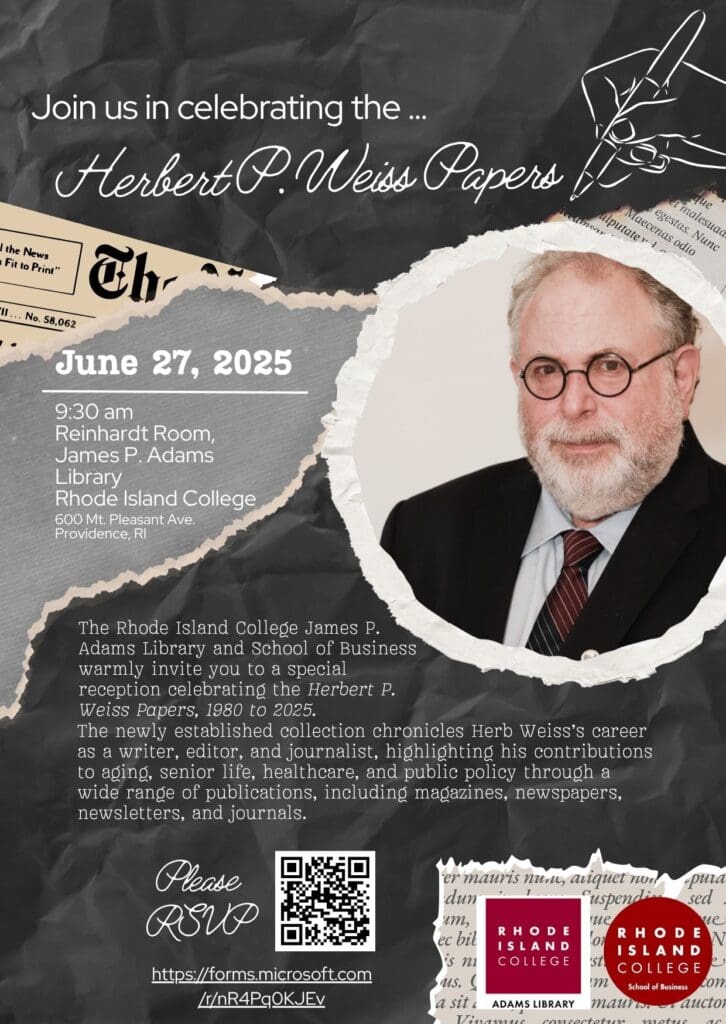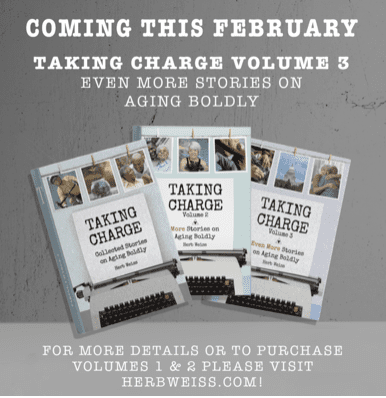Search Posts
Recent Posts
- Rhode Island Weather for June 9, 2025 – Jack Donnelly June 9, 2025
- Our Networking Pick of the Week: Uncle Jay’s Traveling Breakfast Network June 9, 2025
- When favorable treatment looks like discrimination – Mary T. O’Sullivan June 9, 2025
- To Do in RI: Literary Walking Tour, Discussion with writers in residence at Linden Place June 9, 2025
- New report recognizes music’s therapeutic and financial value in Alzheimer’s care – Herb Weiss June 9, 2025
Categories
Subscribe!
Thanks for subscribing! Please check your email for further instructions.

New report recognizes music’s therapeutic and financial value in Alzheimer’s care – Herb Weiss
By Herb Weiss, contributing writer on aging issues
More than 23 years ago, I wrote a column about visiting my 80-year-old mother in Dallas, Texas. She was in the mid-to-late stages of Alzheimer’s disease, and the experience was heartbreaking. I witnessed firsthand how this devastating illness had ravaged her physically and mentally.
By then, she no longer recognized my siblings and often didn’t even recognize my father—her husband of more than 60 years.
During my visit to the 28-bed Alzheimer’s unit at a Dallas-based care facility, staff warned me about her frequent mood swings and how quickly she could become agitated.
While Alzheimer’s strips away memory and cognitive abilities, music often cuts through the fog—soothing agitation and sparking moments of calm. According to the Alzheimer’s Association, “music can be powerful. Studies have shown music may reduce agitation and improve behavioral issues that are common in the middle stages of the disease. Even in the late stages of Alzheimer’s, a person may be able to tap a beat or sing lyrics to a song from childhood. Music provides a way to connect, even after verbal communication has become difficult.”
Indeed, research supports the old adage, “Music has charms to soothe a savage beast,” a line from William Congreve’s 1697 play The Mourning Bride.
Every Friday afternoon, Carrie A. Johns of Blue Rose Entertainment brought life and joy to the facility’s television room through music therapy. She played a steady stream of songs—from early 1900s hits to popular tunes from the 1960s. That day, about 20 selections filled the air: golden oldies, country and western, and Broadway show tunes.
Although my mother couldn’t remember recent events, she knew every word of the songs from her youth. She sang along, not missing a beat.
The music calmed her, lifted her spirits, and unlocked emotions and memories that had seemed long gone.
Music Improves Lives—and Saves Money, too
Just last week, the NeuroArts Blueprint Initiative released a groundbreaking report showing that Music Engagement significantly improves the quality of life for individuals with Alzheimer’s—and for their caregivers. It also presents compelling economic evidence: for every $1 invested in music engagement, there is an estimated $2.40 return annually.
Titled Alzheimer’s Disease & Music Engagement: Quality of Life Economic Impact Analysis and released on June 3, the report estimates the total annual economic value of music engagement—based on quality-of-life improvements—ranges from $5.1 billion to $11.9 billion, depending on adoption levels.
Researchers define music engagement as the use of familiar songs or instruments to enhance mood and stimulate memory. The reported benefits include reduced heart rate and blood pressure, increased social interaction, decreased agitation, and alleviation of depression and anxiety. Music can also stimulate memory recall, improve communication, and foster a sense of identity and belonging.
The findings show that personalized music engagement, led by professional therapists, eases physical symptoms at any disease stage, improves communication and interaction, and reduces caregiver stress. Even when delivered by non-professionals, music engagement positively impacts emotional well-being.

This 44-page report was produced by Deloitte Canada in partnership with the Initiative—a collaboration between Johns Hopkins University’s International Arts + Mind Lab and the Aspen Institute’s Health, Medicine & Society Program—with support from AARP and the A. Barry Rand Fund of the A Foundation.
“AARP wanted to understand the economic value of music engagement for people living with Alzheimer’s disease and its impact on caregivers,” said Sarah Lenz Lock, AARP’s Senior Vice President for Policy and Brain Health, in a June 3 statement. “We already knew music stimulates brain activity, helps manage stress, and enhances well-being. But this report shows just how substantial the benefits are—and how those improvements translate into health care system savings.”
This latest report follows a 2021 study—also commissioned by the Initiative and supported by AARP—which showed that music engagement contributes to broader economic benefits, including gains in GDP, tax revenue, employment, and labor income.
Launched in 2020, the Initiative is working to build the emerging field of neuroarts—an interdisciplinary area rooted in the science of neuroaesthetics. This field explores how the arts and aesthetic experiences influence the brain, body, and behavior, with applications in health care and well-being.
“To build the field of neuroarts, we need more than rigorous science—we need solid economic data to show the real costs and benefits of using the arts to support health,” said Ruth J. Katz, executive director of the Aspen Institute’s Health, Medicine & Society Program, who also co-directs the Initiative. “Strong economic evidence, alongside scientific research, will help make the arts a mainstream part of medicine and public health.”
Economic and Health Care Impact
This newest analysis, the second in a series of economic reports from the NeuroArts Blueprint Initiative, expands upon the 2021 study. Whereas the first focused on broader economic metrics, this latest analysis zeroes in on quality-of-life outcomes for individuals with Alzheimer’s and their caregivers. It examines daily functioning, depression, sleep quality, and caregiver stress—and matches these improvements with potential reductions in health care costs, such as fewer hospitalizations and emergency room visits.
“This latest analysis shows that music engagement not only improves outcomes for individuals with Alzheimer’s and their caregivers, but also reduces health care costs,” said Susan Magsamen, executive director of the Johns Hopkins International Arts + Mind Lab and co-director of the Initiative. “For the first time, we can measure both the personal and economic benefits of integrating music into health care—providing policymakers with the data they need to make informed, cost-effective decisions.”
Magsamen added, “Together, both economic analyses from the Initiative paint a compelling picture of the true value of using the arts to support health and well-being.”
The researchers emphasize that each study’s results should be evaluated independently. However, based on extensive literature reviews, stakeholder consultations, and detailed analysis, the report strongly recommends incorporating music engagement into health insurance plans. The framework used in this study can also serve as a model for evaluating the economic impact of other art forms on different health conditions.
Continued and expanded research can lead to even more effective interventions—benefiting individuals living with Alzheimer’s and the people who care for them.
Resources:
- To access Deloitte’s 2025 Alzheimer’s Disease and Music Engagement report: Download Report
- To watch the 59.9-minute webinar launching the report: Watch Webinar
- To access the December 2021 54-page report: Download 2021 Report
___
To read more articles by Herb Weiss, go to: https://rinewstoday.com/herb-weiss/

Herb Weiss, LRI 12, is a Pawtucket-based writer who has covered aging, healthcare, and medical issues for over 45 years. To purchase his books, Taking Charge: Collected Stories on Aging Boldly and its two sequels, visit herbweiss.com.

